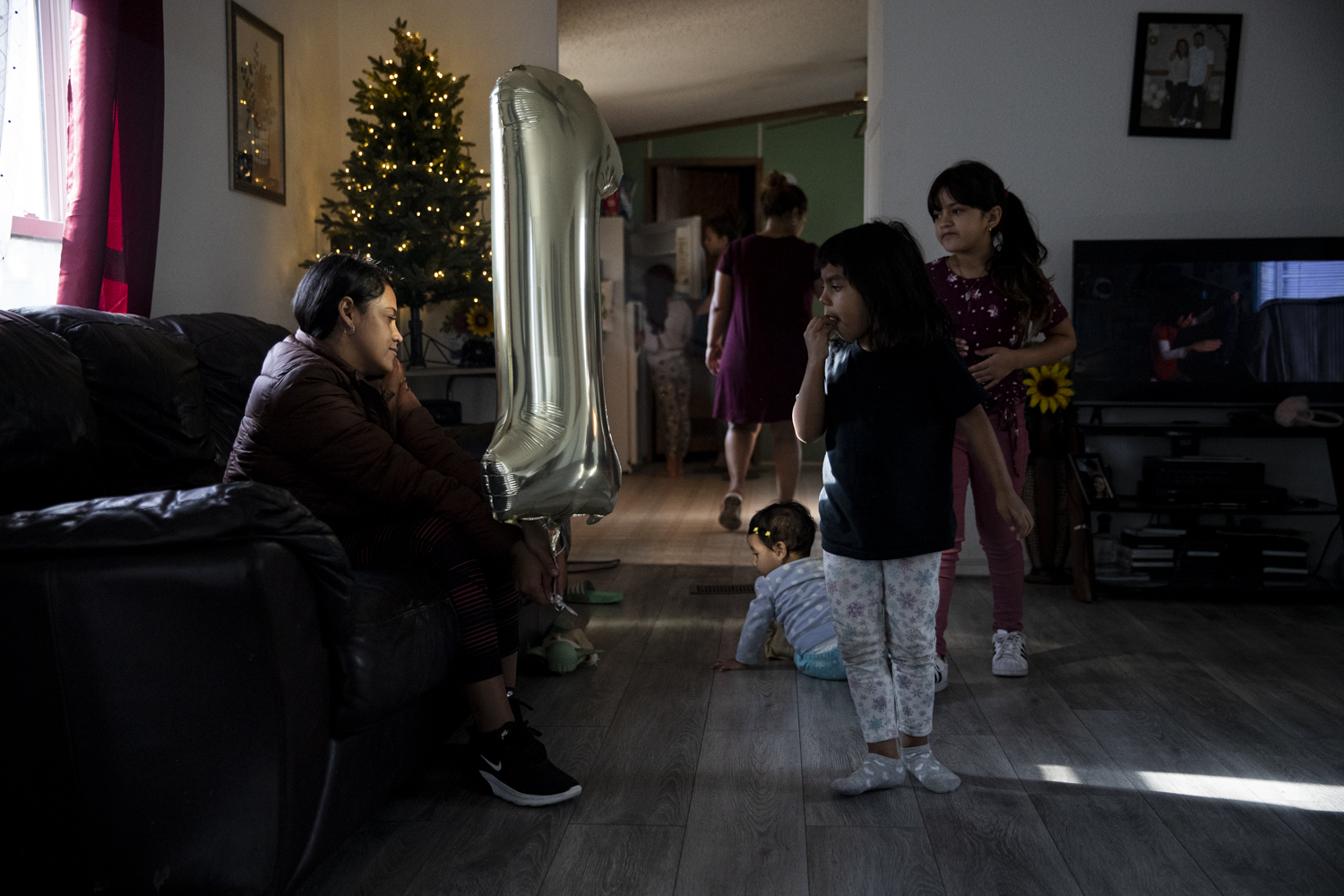When Danixa Johanna Saravia Santos returns home from her job as a house cleaner, her trailer home is bustling with 11 other adults and eight children. When she walks into the kitchen, her foot sinks down because of the home’s uneven floor due to leaky pipes underneath that they can’t afford to repair.
Saravia Santos is one of many immigrants and refugee residents in Iowa City who lives in poor conditions because she can’t afford the cost of living anywhere else in the city.
The National Low Income Housing Coalition reported that 55 percent of all Johnson County renters are housing cost-burdened and 38 percent of renters in the county are severely housing cost-burdened.
She is also a member of Escucha Mi Voz, a community organization that advocates for the rights and equitable treatment of immigrants and refugees in Iowa City.
At the last few Iowa City City Council meetings, Escucha Mi Voz members have packed the council chambers to speak during public comment about their living conditions. At the Nov. 6 meeting and meetings prior, several members spoke of bus routes not adequately serving their neighborhoods and rodent and roach-infested living quarters on top of unaffordable rent.
These members have spoken in favor of the various housing code amendments that are being discussed in the city council. These code changes aim to make housing design and zoning regulations more flexible in the hopes of increasing housing supply and thus making housing more affordable.
At the Oct. 17 city council meeting, Clinton Dimambu, an Escucha Mi Voz member and refugee from the Democratic Republic of the Congo, read a statement in support of the housing code changes during public comment.
Dimambu also said the city council should invest money into creating affordable housing in addition to passing the code changes to further help address the housing crisis Iowa City’s immigrant and refugee community is going through.
“As immigrants and refugees, we are facing problems and the solutions are in your hands. Housing is one of the major problems we are facing,” Dimambu said.
At the Nov. 6 city council meeting, the first set of these amendments was officially passed and adopted into the code. At that same meeting, another set of code changes related to accessory dwelling units – also known as in-law suites – started the process of being passed.
At the city council meetings where these amendments have been discussed, there have been just as many community members who have expressed concern with the amendments as those who have spoken in favor of them.
Former Iowa City mayor Jim Throgmorton, who lives on the northside neighborhood in Iowa City, said he has lived in Iowa City since 1986 and has been a renter, landlord, and homeowner in his time here.
Throgmorton said he feels for the immigrant and refugee community in Iowa City and wants affordable housing for them as well as any other people wanting to live in the city, including students. However, he said the amendments the city is discussing are not guaranteed to target this issue.
While increasing housing supply could potentially drive down the cost of housing, it is not certain, Throgmorton said. He is concerned that investors looking to make a profit will instead take the increased flexibility the changes allow to build more expensive housing.
A particular area of concern for like-minded citizens is the area around the University of Iowa. Some residents, including Throgmorton, worry that the nearby historic neighborhoods will be overrun with rental properties, which could disrupt their character.
Sharon DeGraw, another community member from the northside neighborhood, said the area would likely be impacted the most by these changes because of its proximity to campus, which concerns her in relation to the neighborhood’s character.
“If you have protected historical areas that are right next to unprotected historical areas, if something goes up that’s inexpensive housing and that’s very tall … I think that could introduce a different sort of energy into the neighborhood,” DeGraw said.
Some members have stated they would like to see the area around the UI have special exceptions and changes in the amendments to try to address some of these concerns. For example, Councilor John Thomas proposed changing the amendments so that duplexes built in the UI area are required to have one unit affordable for lower incomes.
In an email to The Daily Iowan, Anne Russett, the city’s senior planner, wrote that regulations restricting rentals in certain areas could lead to barriers for people with lower incomes, disabilities, special needs, and more.
In terms of historical character, Russett wrote the city has several historic and conservation districts within the city that are there to address these concerns and preserve the historic character of the city’s neighborhoods.
Russett wrote these amendments aim to make the city have more diverse housing types across its neighborhoods, which some community members have highlighted in their support of the changes.
Kelcey Patrick-Feree, a citizen in the south district, said mixing rental and single-family residential properties within a neighborhood could actually help increase neighborhood cohesion. She said if the city is segregated based on the different types of housing, it makes it so that people need to move from one part of the city to another as their living and financial situations change.
Patrick-Feree said she is glad the amendments are being discussed and passed, and she trusts the city to take the necessary steps to make their implementation as smooth as possible.
“The whole point is to make Iowa City an easier place for more people to live, and I would find it very frustrating if [the] city council lost sight of that goal,” Patrick-Feree said. “I trust city council to go ahead with these changes and then respond to problems that arise, not scuttle them for the sake of possible harms that we just don’t know if they’ll actually happen.”



